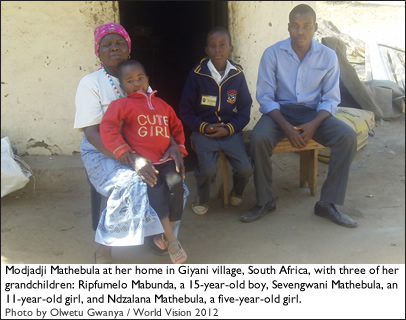South Africa: Women Waiting for Opportunity
By Olwetu Mafutha, World Vision South Africa Communications
Last month South Africa celebrated women’s month. It was in honour of women who marched in protest against oppressive apartheid laws on August 9. The 1956 historic march was viewed as a turning point for the role of women in the struggle for freedom.
 Years later the country has developed one of the most progressive constitutions in the world. Equality and freedom for all citizens is guaranteed. The rights of all people were affirmed - human dignity, equality and freedom.
Years later the country has developed one of the most progressive constitutions in the world. Equality and freedom for all citizens is guaranteed. The rights of all people were affirmed - human dignity, equality and freedom.
However for ordinary women, especially from the rural areas, freedom is still a mystery.
Community research led by Masimanyane Women’s Support Centre, recently undertaken nationally, revealed that while some women have gained a measure of equality with men, and no longer experience discrimination; the majority of women are mired in poverty and untold challenges.
One Woman’s Struggle
Modjadji Mathebula, 65, is one of the thousands of elderly women who find themselves entangled in a painful situation.
She lives in a village of Giyani, in Limpopo province, South Africa. World Vision is in the process of implementing development projects here, together with the community and other partners who are passionate about development work.
Mama Modjadji is raising four grandchildren, between four and 15 years old. The family lives in extremely poor conditions. The children’s single mother died in 2008, at the age of 29.
No Options
Modjadji’s life and that of her grandchildren is characterised by lack of access to basic services, socio-economic development and infrastructure. There are few opportunities for employment or to generate an income.
Additionally, she has limited access to education and skills training.
In the midst of all this, Mathebula had no choice but to take up the responsibility to nurture her grandchildren.
“When Mashangu died, I was extremely hurt,” she says. “I asked God many questions, because I had raised my daughter to take care of her own children. It never occurred to me that after raising her together with her older three siblings, under very difficult circumstances, I would still find myself in such a difficult and painful situation.”
Empowering More Women – A Must
“It is stories like Mma Modjadji’s that motivate World Vision to become so aggressive in empowering women,” says Pontsho K. Segwai, World Vision South Africa’s gender and development coordinator.
She says rural women often feel forgotten as plans to target unemployment, poverty and inequality are unveiled throughout the country.
“We know many women in our country are faced with enormous challenges on a daily basis, and we are determined to hold their hand and help them realise their God given potential,” Pontsho says.
Realising freedom?
Asked about this historic month, Mathebula shakes her head.
“No, I only hear about such things on radio news – those are events that take place in town not here,” she says.
For her, freedom will be realised the day her area gets clean water.
Constitutionally, access to clean water is one of the basic rights but for Mathebula it’s still a dream to be realised. Water scarcity is one of the major challenges in this area. With her government grant of about R1,000 a month [118 US dollars], Mathebula has to pop out money to buy water from the trucks that deliver water on a weekly basis.
Responding to the situation
Thousands of women are like Mathebula.
“Generally, Giyani community is very marginalised and people in this community do not have access to many basic amenities that can enable them to live a healthy life,” says Nyasha Chagwanda, the World Vision South Africa Giyani coordinator.
Thus World Vision has stepped in to intervene.
Some of the programmes World Vision will focus on over the next 15 years will seek to improve the standard of living in this area. These include water and sanitation systems and HIV and AIDS related projects.
“In all our programming we will ensure issues of gender, disability and child protection are integrated,” Nyasha adds.
Through these programmes, World Vision aims to empower women like Mathebula and her community to be able to fend for themselves towards sustainable development.